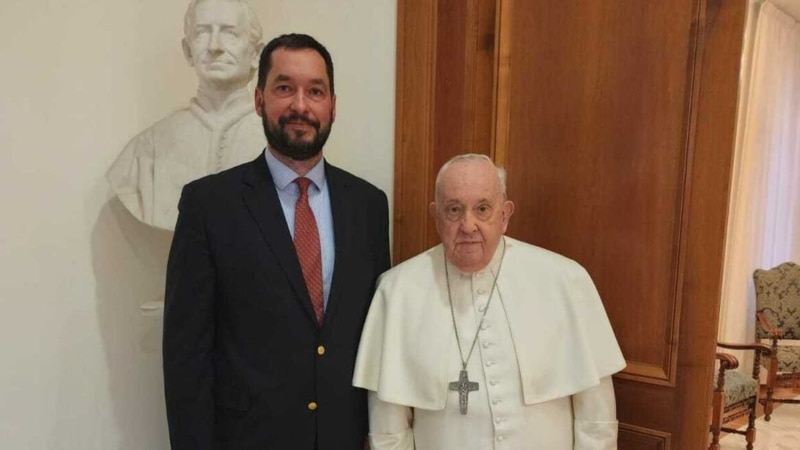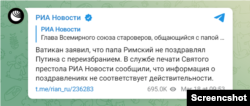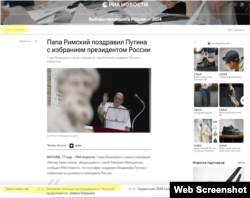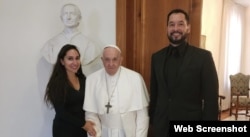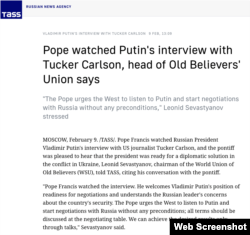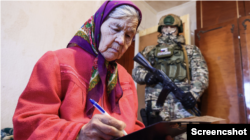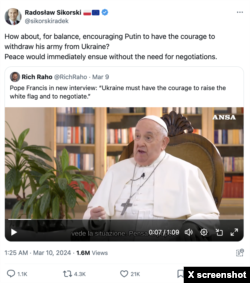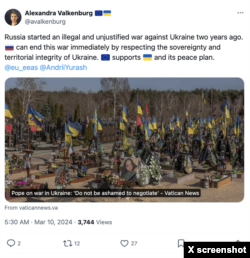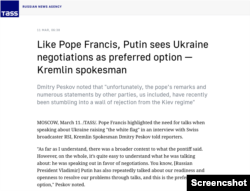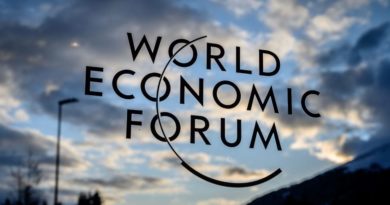Russian State Media Report Pope Congratulated Putin on His Reelection. The Vatican Denies
On March 17, Russia’s state–owned news agency RIA Novosti reported that Pope Francis congratulated Vladimir Putin on “winning the presidential election.”
The agency cited Leonid Sevastyanov, head of the World Union of Old Believers, the congregation of Russian Orthodox Christians who adhere to the liturgy and rituals that existed before the 17th century reform, which they consider a schism.
RIA Novosti quoted Sevastyanov as saying:
“The pope congratulates Vladimir Putin on his election as president of the Russian Federation. Pope Francis sees the Vatican as an international platform that could replace some of the U.N. functions.”
This is false.
Responding to Polygraph.Info’s inquiry about whether the RIA Novosti report that the pope congratulated Putin was accurate, the Holy See press office said in an email that “no messages were sent.”
RIA Novosti retracted the news report in a March 18 post in the Russian messenger Telegram.
However, the agency did not remove the false news report from its main website or add a correction note. The original article remains on RIA Novosti at the time of this writing.
Pope Francis reportedly maintains a personal friendship with Sevastyanov.
The pope uses the leader of the Old Believers to deliver his messages to the Kremlin, Ukraine’s Ambassador to the Vatican Andrii Yurash told The New Voice of Ukraine news outlet in April 2023.
In June 2022, the Paris-based publication Intelligence Online reported that Sevastyanov runs a “communication channel” between the pope and the Kremlin, saying he was “well connected in Moscow.”
That assessment seems to be accurate, as Russian state-owned media routinely quote Sevastyanov as speaking on behalf of the pontiff, mainly quoting his statements and opinions supporting Vladimir Putin and justifying Russia’s invasion of Ukraine.
The RIA Novosti report that the pope had congratulated Putin received traction, with Western media outlets like The Daily Beast and influential social media accounts covering it.
It is worth noting the various events surrounding the 2024 Russian elections, including the death of popular Russian opposition leader Alexey Navalny and the “noon against Putin” protests held at polling stations.
Many Western officials condemned Putin’s acts to repress opposition and declared his rule an autocracy.
“These Russian elections starkly underline the depth of repression under President Putin’s regime, which seeks to silence any opposition to his illegal war,” said British Foreign Secretary David Cameron said. “…Putin removes his political opponents, controls the media, and then crowns himself the winner. This is not democracy.”
Russia orchestrated voting in Russian-occupied areas of Ukraine using Kremlin-appointed officials. It reported that 4.5 million voters were registered in those areas, even though there are only about 2.5 million adults living in those areas, according to the IStories investigative journalism project.
In addition, Russia’s Central Election Commission did not report how many people voted at each of the individual polling stations and election commissions in the occupied areas.
The Washington Post reported that Ukrainians in Russian-occupied territories were “forced to vote in the Russian presidential election under the watch of heavily armed, masked soldiers,” who accompanied election officials as they went “house to house, knocking on doors” to compel participation.
Russian state-owned media outlets have also exploited the pope’s “white flag” gaffe to propagate Russian narratives about the war in Ukraine.
In mid-February, the Swiss broadcasting company RSI quoted the pope as saying about the war in Ukraine: “I think the strongest one is the one who looks at the situation, thinks about the people and has the courage of the white flag, of negotiating…”
The pope’s statement sparked outrage in Ukraine, where it was interpreted as a call for Ukraine to submit to Russia. Many internationally influential figures criticized the pope, saying that Russia, the aggressor, could end the war at any time.
Following the outcry, the Vatican walked back the pope’s comment. The Vatican’s secretary of state, Cardinal Pietro Parolin, insisted that Russia ending its aggression against Ukraine was a primary condition for negotiations to end the war. Vatican spokesperson Matteo Bruni said that the pope used the “white flag” term in response to the interviewer introducing it.
Moscow seized on the pope’s gaffe to legitimize its false narratives denying Russia’s role as the aggressor in the war and insisting its goal is to promote peace.
“You know, Putin has also repeatedly talked about our readiness and openness to solve our problems through talks, and this is the preferred option,” Kremlin spokesperson Dmitry Peskov said.
He added that “unfortunately, the pope’s remarks and numerous statements by other parties, us included, have recently been stumbling into a wall of rejection from the Kyiv regime.”
Russia’s Ambassador to the Holy See Ivan Soltanovsky echoed Peskov and further attempted to villainize Ukraine.
“For our part, we welcome any initiatives that could bring closer the achievement of a strong and lasting peace in Ukraine, especially when they come from such authoritative leaders as Francis….”
In a post on X, Anton Gerashchenko, a former adviser to Ukraine’s internal affairs minister, noted that the pope’s gaffe unfortunately played into long standing Russian narratives.
While Russia claims it is ready to negotiate and supports the pope’s proposal, it has continued to strike Ukraine militarily and tried to discredit any Western and Ukrainian peace initiatives.
In fact, days after boosting the pope’s comments, Russia announced that it will not participate in a Ukraine peace summit planned by Switzerland. Likewise, the Russian state-owned media outlet RT and former Russian Prime Minister and President Dmitry Medvedev have called Western peace efforts “unreasonable” and “unrealistic.”
This article has been archived for your research. The original version from Polygraph.info can be found here.
